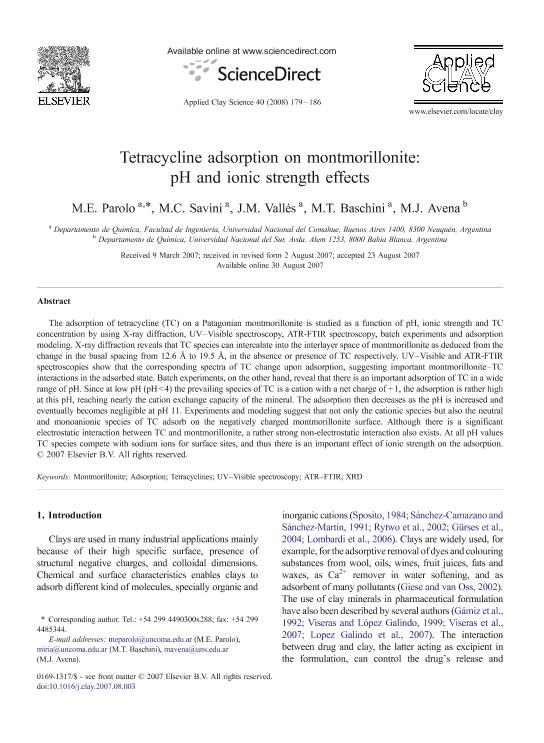Mostrar el registro sencillo del ítem
dc.contributor.author
Parolo, Maria Eugenia

dc.contributor.author
Savini, Monica Claudia

dc.contributor.author
Valles, Jorge Manuel

dc.contributor.author
Baschini, Miria Teresita

dc.contributor.author
Avena, Marcelo Javier

dc.date.available
2018-12-07T15:40:59Z
dc.date.issued
2008-06
dc.identifier.citation
Parolo, Maria Eugenia; Savini, Monica Claudia; Valles, Jorge Manuel; Baschini, Miria Teresita; Avena, Marcelo Javier; Tetracycline adsorption on montmorillonite: pH and ionic strength effects; Elsevier Science; Applied Clay Science; 40; 1-4; 6-2008; 179-186
dc.identifier.issn
0169-1317
dc.identifier.uri
http://hdl.handle.net/11336/66052
dc.description.abstract
The adsorption of tetracycline (TC) on a Patagonian montmorillonite is studied as a function of pH, ionic strength and TC concentration by using X-ray diffraction, UV-Visible spectroscopy, ATR-FTIR spectroscopy, batch experiments and adsorption modeling. X-ray diffraction reveals that TC species can intercalate into the interlayer space of montmorillonite as deduced from the change in the basal spacing from 12.6 Å to 19.5 Å, in the absence or presence of TC respectively. UV-Visible and ATR-FTIR spectroscopies show that the corresponding spectra of TC change upon adsorption, suggesting important montmorillonite-TC interactions in the adsorbed state. Batch experiments, on the other hand, reveal that there is an important adsorption of TC in a wide range of pH. Since at low pH (pH < 4) the prevailing species of TC is a cation with a net charge of + 1, the adsorption is rather high at this pH, reaching nearly the cation exchange capacity of the mineral. The adsorption then decreases as the pH is increased and eventually becomes negligible at pH 11. Experiments and modeling suggest that not only the cationic species but also the neutral and monoanionic species of TC adsorb on the negatively charged montmorillonite surface. Although there is a significant electrostatic interaction between TC and montmorillonite, a rather strong non-electrostatic interaction also exists. At all pH values TC species compete with sodium ions for surface sites, and thus there is an important effect of ionic strength on the adsorption. © 2007 Elsevier B.V. All rights reserved.
dc.format
application/pdf
dc.language.iso
eng
dc.publisher
Elsevier Science

dc.rights
info:eu-repo/semantics/openAccess
dc.rights.uri
https://creativecommons.org/licenses/by-nc-sa/2.5/ar/
dc.subject
Adsorption
dc.subject
Atr-Ftir
dc.subject
Montmorillonite
dc.subject
Tetracyclines
dc.subject
Uv-Visible Spectroscopy
dc.subject
Xrd
dc.subject.classification
Otras Ciencias Químicas

dc.subject.classification
Ciencias Químicas

dc.subject.classification
CIENCIAS NATURALES Y EXACTAS

dc.title
Tetracycline adsorption on montmorillonite: pH and ionic strength effects
dc.type
info:eu-repo/semantics/article
dc.type
info:ar-repo/semantics/artículo
dc.type
info:eu-repo/semantics/publishedVersion
dc.date.updated
2018-11-22T14:28:56Z
dc.journal.volume
40
dc.journal.number
1-4
dc.journal.pagination
179-186
dc.journal.pais
Países Bajos

dc.journal.ciudad
Amsterdam
dc.description.fil
Fil: Parolo, Maria Eugenia. Universidad Nacional del Comahue. Facultad de Ingeniería. Departamento de Química; Argentina
dc.description.fil
Fil: Savini, Monica Claudia. Universidad Nacional del Comahue. Facultad de Ingeniería. Departamento de Química; Argentina
dc.description.fil
Fil: Valles, Jorge Manuel. Consejo Nacional de Investigaciones Científicas y Técnicas; Argentina. Universidad Nacional del Comahue. Facultad de Ingeniería. Departamento de Química; Argentina
dc.description.fil
Fil: Baschini, Miria Teresita. Universidad Nacional del Comahue. Facultad de Ingeniería. Departamento de Química; Argentina
dc.description.fil
Fil: Avena, Marcelo Javier. Consejo Nacional de Investigaciones Científicas y Técnicas. Centro Científico Tecnológico Conicet - Bahía Blanca. Instituto de Química del Sur. Universidad Nacional del Sur. Departamento de Química. Instituto de Química del Sur; Argentina
dc.journal.title
Applied Clay Science

dc.relation.alternativeid
info:eu-repo/semantics/altIdentifier/doi/https://doi.org/10.1016/j.clay.2007.08.003
dc.relation.alternativeid
info:eu-repo/semantics/altIdentifier/url/https://www.sciencedirect.com/science/article/pii/S0169131707001469
Archivos asociados
